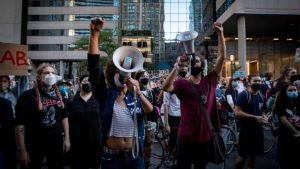Toronto to fund new mental health crisis teams to replace police during some 911 calls

A new city service employing crisis workers with expertise in mental health and de-escalation will replace Toronto police as the first responders for certain non-emergency 911 calls starting in 2022.
Toronto pilot project could remove police from mental health calls — but not in emergencies
The pilot program, approved by city council during its Tuesday meeting, was described by Mayor John Tory as the start of a “fundamental transition” in how the city responds to residents experiencing mental health distress.
The pilot project will be limited to three areas of the city — the northeast, northwest and downtown east neighbourhoods — with a separate mobile crisis unit designed to serve the city’s Indigenous communities.
The program calls for “community anchor partner agencies” to dispatch non-police, mobile crisis teams to appropriate non-emergency crisis calls to 911. Those teams will respond to calls for service, including people in crisis, wellness checks and other types of calls still to be determined.
The development of the pilot project started in June 2020, when council directed Toronto’s city manager to build a non-police alternative to respond to calls of residents in crisis. Work on it began in the wake of global protests against police brutality and anti-Black racism. The 2020 deaths of Regis Korchinski-Paquet, Ejaz Choudry, D’Andre Campbell and others during interactions with police sparked calls for change across the Greater Toronto Area.
The pilot is planned to operate from 2022 to 2025, with the possibility of wider implementation at the conclusion of that trial period.
“These are the first important steps along the road of having these calls for people in distress answered by professionals other than the police,” Tory told reporters before council met.

Tory introduced a successful amendment during Tuesday’s meeting calling for the program to be expanded sooner than 2025 “if proven effective.”
Toronto plans to set aside $1.7 million in its 2021 budget to develop the pilot project. The program is expected to cost between $7 and $8 million annually when it begins.
Police responding to many more ‘person in crisis’ calls
Police officers are currently designated as the primary first responders for most types of mental health calls, despite the findings of many experts that trained health professionals would be better suited to help residents in those situations.
“While police are skilled and essential professionals, they are not health-care experts,” wrote Catherin Zahn, CEO of the Centre for Addiction and Mental Health, in a letter endorsing the program.
“In the same way that a person having a heart attack is met with a health response, people experiencing a mental health emergency should be met with emergency health care.”
Toronto police say they have experienced a 32.4 per cent increase in “person in crisis” calls during the past five years, amounting to around 30,000 such calls annually.
Toronto police have requested a $1.076-billion budget for the 2021 fiscal year, which represents a zero per cent increase.
Council taking on packed schedule during first meeting of year
City council is set to debate dozens of separate items this week during the group’s first meeting of 2021.
Tory designated the pilot project on mobile crisis teams and an updated plan for his SmartTrack transit network as his two key items for the meeting.
City council is also expected to debate the creation of a new small business tax class and a possible property tax reduction for those businesses, a request that Ontario stop the demolition of the Foundry Dominion site, and a possible redesign of Yonge Street in downtown Toronto, among other items.








Redes Sociais - Comentários